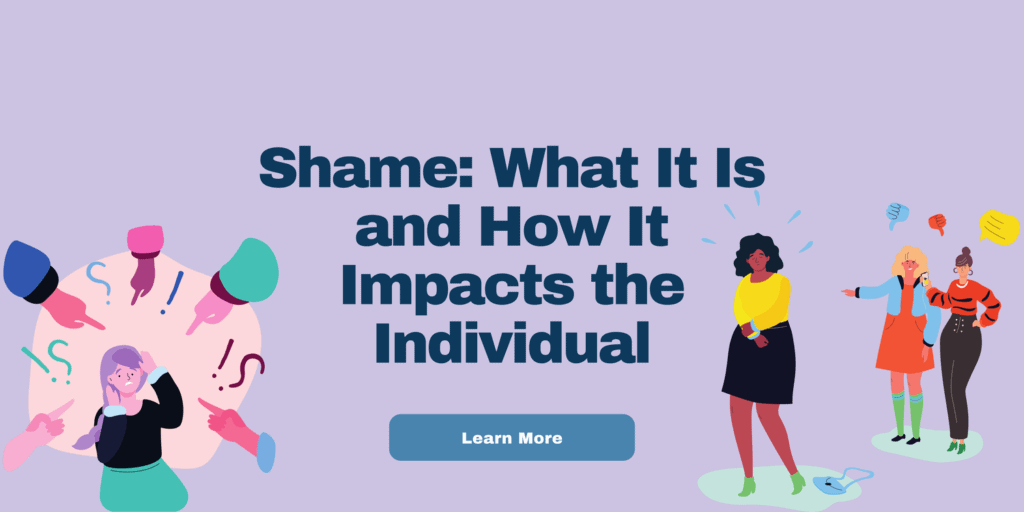Shame is a powerful emotion that can have a significant impact on the individual. Shame can be described as feeling defective or unworthy of love and respect. It often leads to feelings of isolation and secrecy. Shame can be very damaging to mental health and wellness, so it is important to understand it and how to deal with it. In this blog post, we will discuss shame in more detail and explore how it affects the individual.
When we are not accepted for who we are (even if it is only perceived), shame can develop and grow within us. Shame is often at the core of mental health issues such as anxiety, depression, eating disorders, addiction, and more. Shame can be a very painful emotion, and it is important to understand how to deal with it to heal from it.
There are many ways shame manifests itself in our lives. We may feel like we are not good. Shame is different from guilt because it tells us there is something wrong with us while guilt tells us we did something wrong.
Shame is often based on irrational beliefs that we hold about ourselves. Shame can be debilitating and make us feel like we are not worthy of love or belonging.
It is often the result of trauma, whether it be physical, sexual, emotional, or spiritual. Shame can also pass down from generation to generation; this is generational trauma. If you grew up in a family where shame was a part of your life, you may have internalized it, and it may be something you struggle with today.
If you are struggling with shame, know that you are not alone. Shame is a very common emotion and one that many people deal with on a daily basis. There are many resources available to help you deal with shame and begin to heal from it.
Shame impacts the way you view yourself and lowers your self esteem and self worth. It can cause you to believe that you are not good enough and that you do not deserve love, happiness or belonging. You doubt yourself which impacts your ability to make decisions. This can make us feel stuck and powerless. Shame can also lead to depression, anxiety, and other mental health issues. If you are struggling with shame, please reach out for help. There is no shame in seeking help from a therapist or counselor. They can provide you with the support and resources you need to begin healing from shame.
Shame is a negative emotion accompanied by feelings of embarrassment, humiliation, and inadequacy. Shame is different from guilt in that shame focuses on who we are as a person, while guilt focuses on our actions.
When we experience shame, we often try to hide it from others out of fear of rejection or judgment. We may avoid eye contact, shrink away from others, or even put up walls to protect ourselves. This can lead to further isolation and loneliness. Shame can lead us to act out in harmful ways such as using drugs or alcohol, engaging in risky behaviors, or harming ourselves.
Shame will tell us that we are not good enough. Shame is the voice in your head telling you that you’re not good enough, that you’ll never be able to achieve, or that you’re not worthy of love; so instead, we pretend to be someone we are not. We put on a mask and try to fit into a mold that society has created. But the truth is, we are all worthy of love and belonging.
If you’re struggling with shame, know that you are not alone. Seek out a therapist or counselor who can help you work through these feelings. You deserve to live a life free from shame.
Shame is such an icky, icky feeling. It’s that sinking feeling in your stomach when you realize you’ve made a mistake, or when someone points out something about you. When we are not ourselves in relationships, we will worry about the other person leaving us if they find out who we are. Shame can also be debilitating, and make it difficult to connect with others.
Start your journey today towards a shame-free life! You are worth it.
Since we do not feel worthy or deserving of love, and doubt our ability to make good decisions for ourselves, we look for validation and approval. We seek out others to give us a sense of worthiness, which can be damaging and lead to further shame. So how do we start to move away from shame and towards living a shame-free life?
First, it is important to understand that shame is not your fault. Shame is often the result of messages we received growing up, whether they were explicit or implicit. The first step in healing from shame is recognizing that these messages are not true – they are lies that we tell ourselves.
We lack boundaries and do not focus on our own needs, leading to self abandonment and betrayal, for the sake of a relationship. Shame is also a form of self-attack; it muffles our authentic voice because we are afraid to be as we are. We become so focused on people-pleasing and living up to others’ expectations that we lose sight of our own wants and needs.
Shame creates a sense of disconnection from others, leading to feelings of isolation and loneliness. When we are feeling shame, we often want to hide away and avoid social interactions which can lead to feelings of loneliness, increased anxiety, or depression.
The first step in overcoming shame is recognizing that it’s not your fault; you are not responsible for the messages you received growing up. It’s also important to start building healthy boundaries, focusing on your own
We lack boundaries and do not focus on our own needs, leading to self abandonment and betrayal, for the sake of a relationship. Shame is a weight that we all carry, but it doesn’t have to define us. With awareness and understanding, we can start to let go of shame and live our lives .
If you’re struggling with shame, please reach out for help. You are not alone. Here are some resources and tips that may be helpful:
- Acknowledge shame when it comes up and allow yourself to feel it.
- Talk about shame with someone you trust. Shame lives in hiding and bringing it out into the open will help release the control it has over us. It needs to be talked about within trusted and safe relationships and spaces.
- Write about shame and explore what might be underneath it.
- Practice self-compassion and extend compassion to others.
- Seek professional help if shame is impacting your life in a negative way. Seeing a therapist can help .
- Find people, groups, or communities that can relate or empathize. This will provide support and normalize your experience.
- Mindfulness, meditation, and grounding techniques. This allows us to stay present in our bodies and focus on what is happening in front of us. This disrupts spirals of shame and guilt.
- Learn to set boundaries. This can be difficult if shame is something that you grew up with but it is so worth it.
- Create intentional distance from people whom around you do not feel safe. Create distance from people who shame you or cross your boundaries. This can be difficult, but it is necessary to begin healing from shame.
- Seek out relationships with people who will support us and see our worth, even when we don’t see it ourselves. These are the people who will encourage us to grow into our best selves. With their help, we can begin to heal the shame that’s been holding us back and start living a life we’re proud of.
- Seek out accepting people who will love us shame and all. These are the people who will see our worth even when we don’t and will encourage us to grow into our best selves.
- Writing/ speaking/ repeating affirmations. Such as:
I deserve respect
I am worthy of love and affection
I am not obligated to be what someone else expects me to be
I do not need to be perfect to be worthy or good enough
Shame is something that so many of us deal with on a daily basis, but it doesn’t have to control us. We can learn to manage it and even heal from it with time, patience, and practice. With awareness and understanding, we can start to let go of shame and live our lives more.
I hope this article was helpful in understanding shame and how it impacts the individual. If you found this article helpful, please share it with someone who might need it. As always, thanks for reading!
Warmest Regards,





